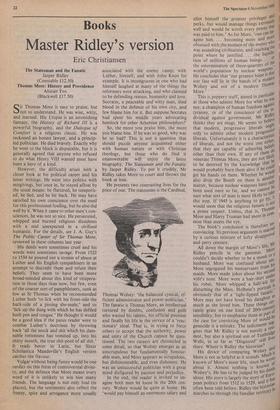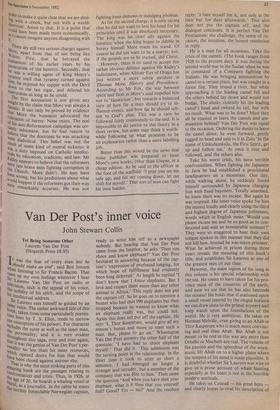Books
Master Ridley's version
Eric Christiansen
C
it Thomas More is easy to praise, but kJ not to understand. He was wise, witty, and learned. His Utopia is an astonishing fantasy, the History of Richard III is a powerful biography, and the Dialogue of Comfort is a religious classic. He was reckoned an honest lawyer, and a princip- led politician. He died bravely. Exactly why he went to the block is disputable, but it is generally agreed that anyone who refused to do what Henry VIII wanted must have been a hero of a kind.
However, the difficulty arises with a closer look at his political career and his lesser writings. He went into politics with misgivings, but once in, he stayed afloat by the usual means: he flattered, he temporis- ed, he lied, and he bit back. He may have satisfied his own conscience over the need for this professional fouling, but he also did well by it. When it came to other men's con- sciences, he was not so nice. He persecuted, whipped and burned religious dissidents with a zeal unexpected in a civilised humanist. For the details, see J. A. Guy's The Public Career of Sir Thomas More, reviewed in these columns last year.
His deeds were sometimes cruel and his words were sometimes savage. From 1522 to 1534 he poured out a stream of abuse at Luther and his English sympathisers in an attempt to discredit them and refute their beliefs. They seem to have been more broad-minded about this kind of vitupera- tion in those days than now, but few, even of the coarser sort of pamphleteers, sunk as low as St Thomas when he recommended Luther both 'to lick with his front-side the back-side of a pissing she-mule,' and to `lick up the dung with which he has defiled both pen and tongue.' He thought it would be a good idea if the pious reader were to combat Luther's doctrines by throwing back 'all the muck and shit which his dam- nable rottenness has vomited up, into his shitty mouth, the true shit-pool of all shit.' It reads better in Latin, but Sister Scholastica Mandeville's English version catches the flavour.
Vulgar without being funny would be one verdict on this form of controversial divini- ty, and the defence that More meant every word of it is unlikely to win him many friends. The language is not only foul (in places), but the sentiments also reflect the frenzy, spite and arrogance more usually
associated with the enemy camp; with Luther, himself, and with John Knox for example. It is incongruous in one who had himself laughed at many of the things the reformers were attacking, and who claimed to be defending reason, humanity and love. Socrates, a peaceable and witty man, shed blood in the defence of his own city, and few blame him for it. But suppose Socrates had spent his middle years advocating hemlock for other Athenian philosophers?
So, the more you praise him, the more you blame him. If he was so good, why was he so bad? This is not a question that should puzzle anyone acquainted either with human nature or with Christian theology, but those who do find it unanswerable will enjoy the latest biography, The Statesman and the Fanatic by. Jasper Ridley. To put it crudely, Mr Ridley takes More to court and throws the book at him.
He presents two contrasting lives for the price of one. The statesman is the Cardinal, Thomas Wolsey: 'the balanced cynical, ef- ficient administrator and power-politician.' The fanatic is Thomas More, an intellectual tortured by doubts, confusion and guilt who wasted his talents, his official position and finally his life in the service of a 'reac- tionary' ideal. That is, in trying to force others to accept that the authority, power and unity of the Church cannot be ques- tioned. The two careers are chronicled in some detail, so that Wolsey emerges as an unscrupulous but fundamentally honour- able man, and More appears as scrupulous, but dishonourable, and even dishonest. He was an unsuccessful politician with a great mind disfigured by passion and prejudice.
In the end, the reader is invited to im- agine both men let loose in the 20th cen- tury. Wolsey would be quite at home. He 'would pay himself an enormous salary and
perks, but would manage things extremely well and would be worth every penny that was paid to him.' As for More, 'one can in' agine him becoming more and mote obsessed with the menace of the enemy Who was assaulting civilisation, and reaching the
point where he justified
the linnicla tion of millions of human beings.. • .o1. the extermination of three-quarters of the, world's population by nuclear weapons.' He concludes that 'our greatest hope is that our fate will lie in the hands of a modern Wolsey and not of a modern Thomas This is peppery stuff, aimed in particular at those who admire More for what he Os not: a champion of human freedom against tyranny, or of the conscience of the,, dividual against government. Mr thinks they are mugs. He seems to believe that modern, progressive liberals ought only to admire other modern Progressiv.e liberals. Unfortunately it is a characteristic of liberals, and not the worst one eithe that they are capable of admiring Wit; other than their own. If any of them u," venerate Thomas More, they are not like6 to be deterred by the knowledge that 11,,ie would probably burn them alive if he cotu' ld get his hands on them. Whether he wou also drop the Bomb on them is another matter, because nuclear weapons have only been used once so far, and we cannot be „e sure what sort of man is most likely to ta% this step. If 1945 is anything to go bY, would seem that the religious fanatic is not a prime suspect. Unless, that is, Thomas More and Harry Truman had more in Folu mon than meets the eye. The book's conclusion is therefore nn'convincing. Its previous argument is marred by a curious mixture of lofty disapproval and petty censure.
All down the margin of More's
f Mr Ridley pencils in the gammas. mu': couldn't decide whether to be a monk 01: husband. More was confused about sex's s More segregated his menservants from hi, maids. More made jokes about his secorlo wife's nose. More wore a hair-shirt under his robes. More whipped a half-wit O..' disturbing the Mass. Holbein's portrait is obviously that of a light-lipped fanatic More may not have loved his daughter as much as she loved him. These things cer' tainly grate on one kind of 20th-centi sensibility, but to emphasise them as Part2, the case for convicting More of would'” genocide is a mistake. The indictment 511: gests that Mr Ridley is not merely a ,,te dent, but also a spiritual son of Tun yes Wells, in so far as 'Disgusted' still live
there. Where is Ridley the historian? d
His device of comparing WolseY alts More is not as helpful as it sounds. Mile" te known of More's inner life, since he wruof about it. Almost nothing is known ds Wolsey's. He has to be judged by his ciee; alone. His story is largely the story of Euro pean politics from 1512 to 1529, and it 11, often been told before. Ridley the histori4', marches us through the familiar territory in order to make it quite clear that we are deal- ing With a crook, but not with a world- destroyer. Amen to that. It is a point that could have been made more economically, as I cannot imagine anyone disagreeing with it.
There are still two serious charges against More, apart from that of not being like
,Y°IseY. First, that he betrayed the "umanism of his earlier years by his Persecution of the heretics. Secondly, that he was a willing agent of King Henry's 3.rannY until that tyranny turned against h irn; he enjoyed his supper with the Devil , "Own to the last cigar, and delayed his martyrdom as long as he could. The first accusation is not given any f' eight by the claim that More was always a „anatic. It can only be proved by evidence that More the humanist advocated the toleration of heresy. None exists. The zeal of his anti-Reformation campaign was cer- LainlY inhumane, but he had reason to velieve •
that the doctrines he was attacking were diabolical. This belief was not the result of some kind of mental sickness; it
was a duty imposed on Catholic intellec- Rals by education, tradition, and law. Mr Idley appears to believe that the reformers ,%%,_ere just brave men fighting corruption in `Lne Church. More didn't. He may have ueen wrong, but his predictions about what would happen if the reformers got their way were remarkably accurate. He was not fighting inner demons or indulging phobias.
As for the second charge, it is only saying that he did not want to lose his head for his principles until it was absolutely necessary. The king was his chief ally against the heretics; when the king began to dabble in heresy himself More made his stand. Of course he did not want to be a martyr; nor, if the gospels are to be trusted, did Christ. However, there is no need to accept this rather obvious defence against Mr Ridley's indictment, when Alistair Fox of Otago has just written a more subtle antidote in Thomas More, History and Providence. According to Mr Fox, the war between spirit and flesh in More's soul impelled him not to 'fanaticism', but towards a balanced view of how far a man should try to in- fluence events, and how far he should sub- mit to God's plan. This was a view he followed fairly consistently to the end. It is impossible to do justice to this theory in a short review, but some may think it worth- while following up what promises to be an explanation rather than a mere labelling job.
Better than this would be the news that some publisher was prepared to issue More's own works, other than Utopia, in a cheap edition. As he said to the officer at the foot of the scaffold: 'I pray you see me safe up; and for my coming down, let me shift for myself.' That sort of man can fight his own battles.















































 Previous page
Previous page